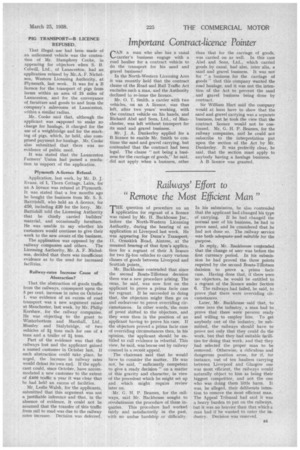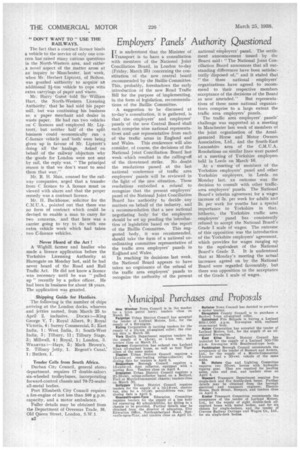Railways' Effort to "Remove the Most Efficient Man"
Page 35

Page 36

If you've noticed an error in this article please click here to report it so we can fix it.
THE question of procedure on an I application for regrant of a licence was raised by Mr. H. Backhouse Jnr., before the North-Western Licensing Authority, during the hearing of an application at Liverpool last week. He was appearing for Dunn's Transport, 11, Ormskirk Road, Aintree, at the resumed hearing of that firm's applica, bon for a regrant of their A licence for two 2i-ton vehicles to carry various classes of goods between Liverpool and Scottish points,.
Mr. Backhouse contended that since the second Bouts-Tillotson decision there was a new procedure arising. The onus, he said, was now first on the applicant to prove a prima fade case for regraut. If he succeeded in doing that, the objectors might then go on and endeavour to prove overriding circumstances. In other words, the onus of proof shifted to the objectors, and they were then in the position of an applicant having to prove his case. If the objectors proved a prima facie case of overriding circumstances then, in his opinion, the applicant should be entitled to call evidence in rebuttal. This view, he said, was borne out by railway counsel in a recent appeal.
The chairman said that he would have to consider the matter. He was not, he said, "sufficiently competent to give a ready decision" on a matter of this gravity and character, in view of the precedent which be might set up and which might require review later on.
Mr. G. H. P. Beames, for the railways, said Mr. Backhouse sought to revolutionize the procedure of these inquiries. This procedure had worked fairly and satisfactorily in the past, with no undue hardship or difficulty. In his submission, he also contended that the applicant had changed his type of carrying. If he had changed the normal user of his business, he had to prove need, and he considered that he had not done so. The railway service was both adequate-and suitable for the purpose.
In reply, Mr. Backhouse contended that the change of user was before the first currency period. In his submission he had proved the three points required by the second Bouts-Tillotson decision to prove a. prima facie case. Having done that, if there were no objectors, he would be entitled to a regrant of the licence under Section 6. The railways had failed, he said, to prove that there were overriding circumstances.
Later, Mr. Backhouse said that, to come into the industry, a man bad to prove that there were persons ready and willing to employ him. To get anybody out of the industry, he submitted, the railways should have to prove not only that they could do the work, but that they had suitable facilities for doing that work, and that they .had selected the proper man to be removed. Otherwise, a ridiculous and dangerous position arose, for if, for instance, out of ten hauliers carrying between Liverpool and Glasgow one was most efficient, the railways would naturally object to him as being their biggest competitor, and not the one who was doing them little harm. It was, he alleged, their deliberate intention to remove the most efficient man. The Appeal Tribunal had said it was a heavy burden to put on the railways, hut it was no heavier than that which a man had if he wanted to enter the industry. Decision was reserved.
"DON'T WANT TO" USE THE RAILWAYS.
The fact that a contract licence binds a vehicle to the service of only one concern has raised many carious questions in the North-Western area, and rather a novel aspect of the matter arose at an inquiry in--Manchester, last week, when Mr. Herbert Liptrott, of Bolton, was granted 'authority to acquire all additional 2i-ton vehicle to cope with extra carryings of paper and waste.
Mr. Harry Guest told SirWilliam Hart, the North-Western Licensing Authority, that he had sold his paper mill, but was continuing his business as n .paper merchant and dealer in waste paper. He had ran two vehicles on C licences and employed Mr.Liptrott, but neither half' of the split business could economically run. a C-licence vehicle and 'both' were being given up in faVour of -Mr. Liptiott's doing all the haulage. Asked. on behalf of the railway 'Objectors why the goods for London were not sent by rail, the reply was, "The principal reason is that we don't want to send them that way."
Mr. R. H. Mais, counsel for the railway companies, urged that a transfer from C licence to A licence must oe viewed with alarm and that the proper remedy was a contract licence.
Mr. H. Backhouse, solicitor for the C.M.U.A., pointed out that there was no form of contract which could be devised to enable a man to carry for two concerns, and that here was a carrier going to try to 'do with one extra vehicle work which had taken two C-licence vehicles.
Never Heard of the Act !
A Wighill farmer and haulier who made a licence application before the Yorkshire Licensing Authority at Harrogate on Monday last, said he had never heard of the Road and Rail Traffic Act. He did not know a licence was necessary until he was " pulled up" recently by a police officer. He had been in business for about 18 years. The application was granted.
Shipping Guide for Hauliers.
The following is the number of ships arriving at the London docks, wharves and jetties named, from March 25 to April 2, inclusive. Docics:—King George V. 7: Royal Albert, 9; Royal Victoria, 4; Surrey Commercial, 5; East India, I; West India, 3; South-West India, 3; Tilbury, U; Tilbury Stage, 3; Millwall, 4 Royal, 1; London, 3. Waaavss :—Hays, 5; Mark Brown's, 2. Tilbury Jetty, 1. Regent's Canal; 1: Butlers, I.
Tender Calls from South Africa.
Durban City Council, general stores department, requires 17 double-saloon six-wheeled trolleybuses. incorporating forward-control chassis and 70-72-seater all-metal bodies.
Port Elizabeth City Council requires a fire-engine of not less than 500 g.p.m. capacity, and a motor ambulance.
Fuller details may be obtained from the Department of Overseas Trade, 35, Old Queen Street, London, S.W.1.
B2




























































































